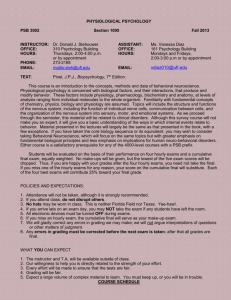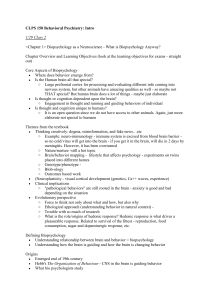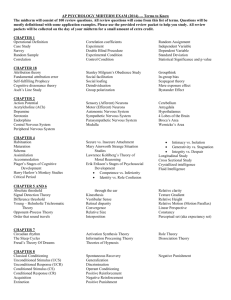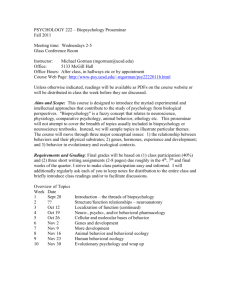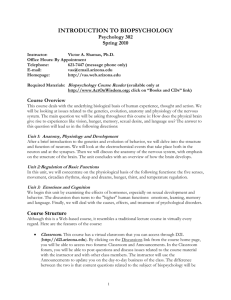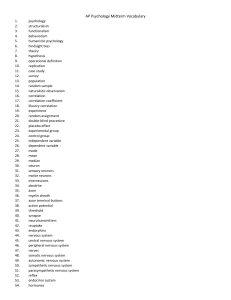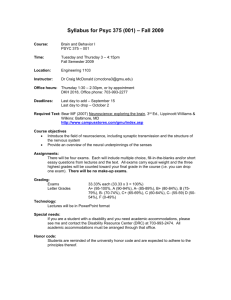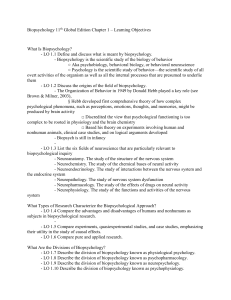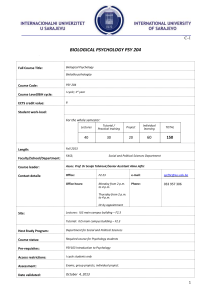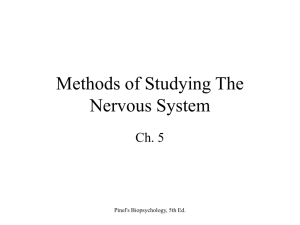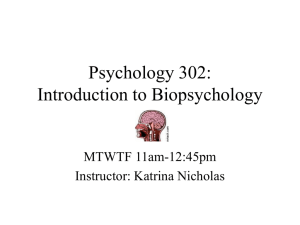PSB 4003 / BIOPSYCHOLOGY
advertisement
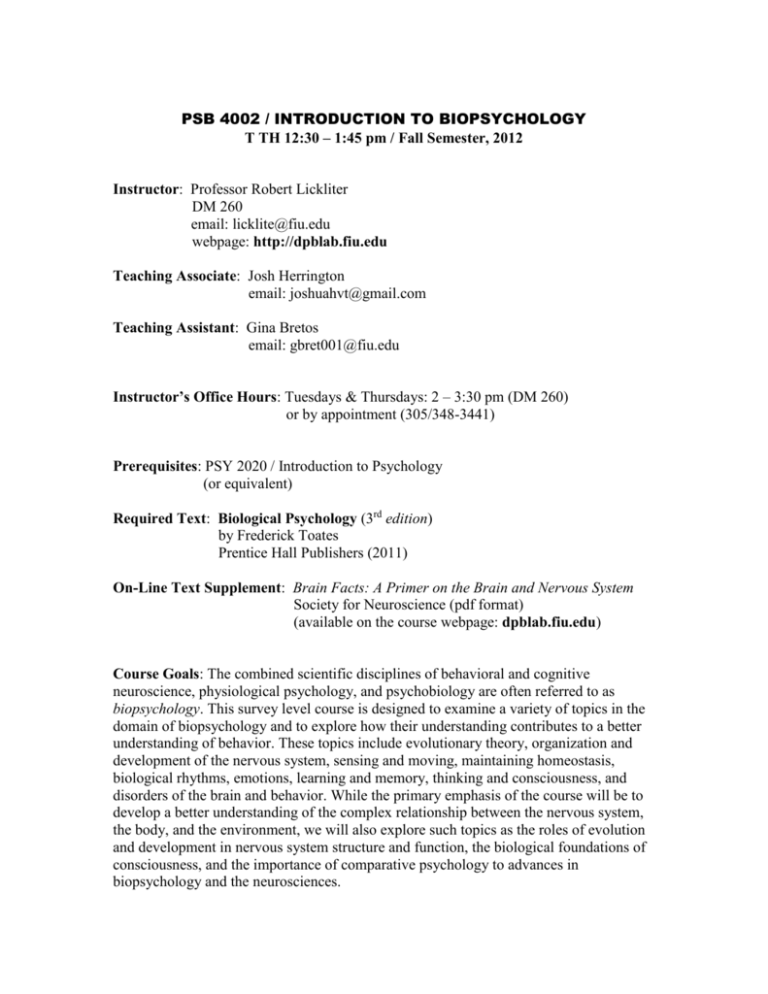
PSB 4002 / INTRODUCTION TO BIOPSYCHOLOGY T TH 12:30 – 1:45 pm / Fall Semester, 2012 Instructor: Professor Robert Lickliter DM 260 email: licklite@fiu.edu webpage: http://dpblab.fiu.edu Teaching Associate: Josh Herrington email: joshuahvt@gmail.com Teaching Assistant: Gina Bretos email: gbret001@fiu.edu Instructor’s Office Hours: Tuesdays & Thursdays: 2 – 3:30 pm (DM 260) or by appointment (305/348-3441) Prerequisites: PSY 2020 / Introduction to Psychology (or equivalent) Required Text: Biological Psychology (3rd edition) by Frederick Toates Prentice Hall Publishers (2011) On-Line Text Supplement: Brain Facts: A Primer on the Brain and Nervous System Society for Neuroscience (pdf format) (available on the course webpage: dpblab.fiu.edu) Course Goals: The combined scientific disciplines of behavioral and cognitive neuroscience, physiological psychology, and psychobiology are often referred to as biopsychology. This survey level course is designed to examine a variety of topics in the domain of biopsychology and to explore how their understanding contributes to a better understanding of behavior. These topics include evolutionary theory, organization and development of the nervous system, sensing and moving, maintaining homeostasis, biological rhythms, emotions, learning and memory, thinking and consciousness, and disorders of the brain and behavior. While the primary emphasis of the course will be to develop a better understanding of the complex relationship between the nervous system, the body, and the environment, we will also explore such topics as the roles of evolution and development in nervous system structure and function, the biological foundations of consciousness, and the importance of comparative psychology to advances in biopsychology and the neurosciences. Course Format and Grading: There are two sources of information you will be responsible for: the class lectures and your assigned textbook readings. Your grade in this course will depend on your performance on three midterms and a final exam. The three midterm exams and the final exam will consist of both multiple choice and true/false questions and each exam will count 50 possible points. The material to be covered in each exam will include both assigned readings in your text and lecture material presented in class. This means you are responsible for both sources of course information, the assigned readings and the classroom lectures. The final exam will not be cumulative and will essentially be a fourth midterm. Your final letter grade in the course will be directly translated from your overall percentage, which will be derived from the total number of points you accumulate across the three midterms and the final out of the possible 200 points. Important: Since this is a survey level course and we must cover a large amount of material over the semester, the assigned textbook readings and the lecture material presented in class will rarely overlap in their content, so class attendance is necessary for you to do well in the course. No makeup exams will be provided without a valid medical release. Plan to be in class for all four scheduled exams. The date of the exams will be announced at least two weeks prior, and your will receive sample study questions and the lecture powerpoint slides one week prior to each exam. Please arrive to lecture on time (12:30 pm). It is distracting to both the instructor and other students if you arrive after lecture begins. I appreciate how challenging it can be to be “unplugged” for more than an hour – nevertheless, I expect you to turn off your cell phones, social media, etc. and actively participate in the lecture while you are in the classroom. All aspects of your coursework are covered by the University’s Honor System. In regards to cheating and plagiarism - don’t do it! Grading Scheme (Based on your total overall points, divided by 2): 93-100% 90-92 % 88-89 % 83-87 % 80-82 % 78-79 % 73-77 % 70-72 % 68-69 % 63-67 % 60-62 % Below 60 A AB+ B BC+ C CD+ D DF Tentative Lecture Outline and Reading Assignment (by semester week): 1. Overview of the course; the issue of complexity and the importance of a “systems” perspective to brain/behavior relationships; historical perspectives on the neurosciences. [Chapter 1] 2. Basic layout of the nervous system; the cellular/chemical/electrical nature of the CNS. [Chapter 3] 3. Conceptual and empirical foundations of biopsychology and the neurosciences; development of the nervous system. [Chapter 6] MIDTERM #1 4. Plasticity; The role of experience and activity in nervous system structure and function; the organization of the brain and why it matters. [Chapter 5] 5. Perception/action systems; movement. [Chapter 7; Chapter 10] 6. Physiological foundation of emotions; stress and health; the immune system. [Chapter 12; Chapter 13) MIDTERM #2 7. Categorization, memory, and learning [Chapter 11] 8. Sexual behavior and reproduction; the value of a comparative perspective [Chapter 17] 9. Sleep and waking [Chapter 19] 10. Cognition; the role of language in understanding the human brain/behavior relationships. [Chapter 20] MIDTERM #3 11. A biological theory of consciousness; self, identity, subjectivity [Chapter 21] 12. Brain dysfunction and diseases of consciousness; mental illness. [Chapter 22] 13. Evolutionary perspectives on behavior; the importance of comparative and ecological approaches to advances in biopsychology; modeling human behavior. [Chapter 2] 14. A look to the future; review for final. FINAL EXAM
